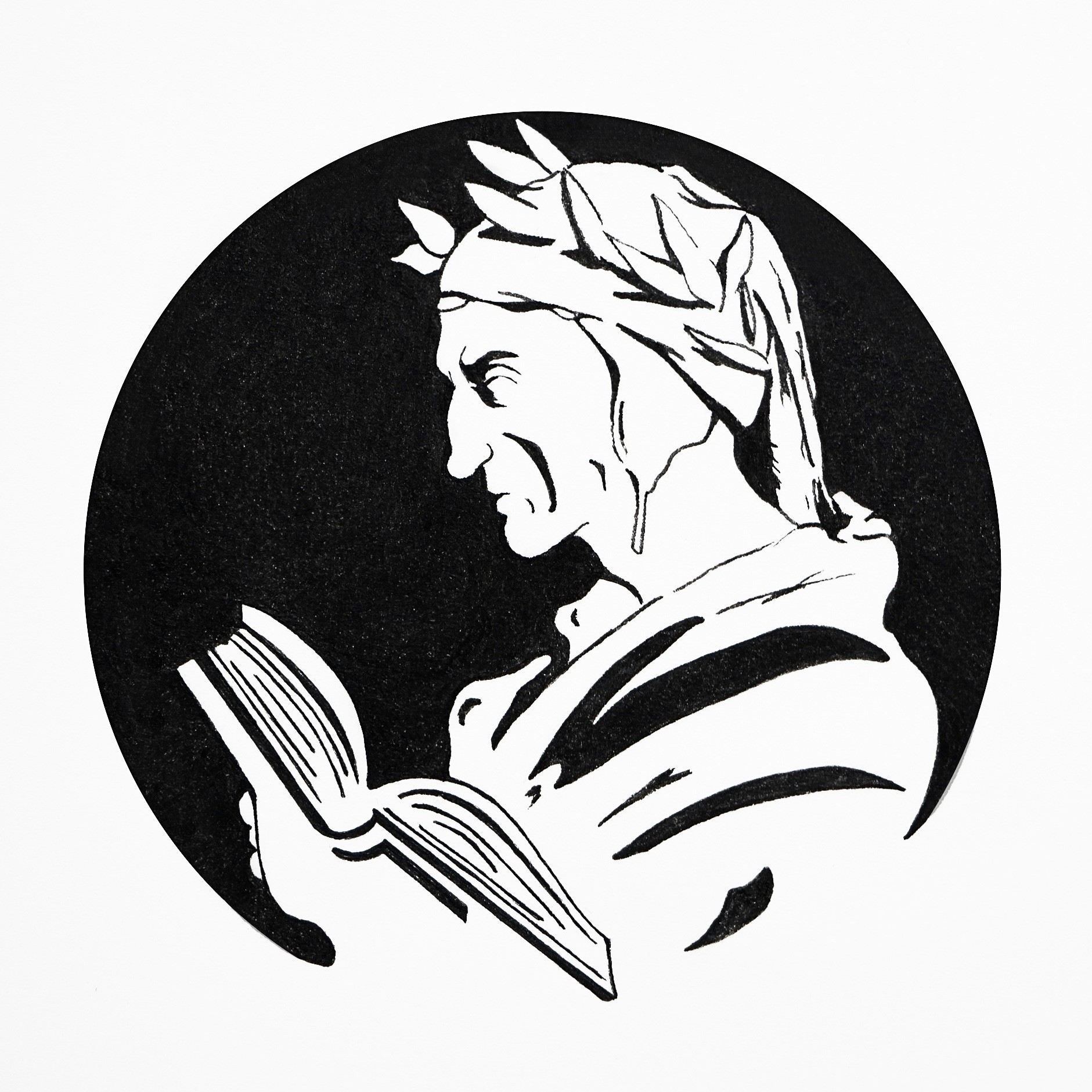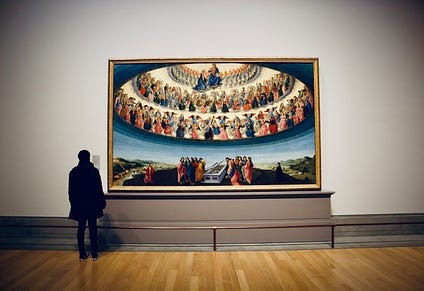Who is Dante’s guide through Hell and Purgatory? Virgil, the embodiment of human reason and wisdom, leads Dante through the harrowing depths of the Inferno and up the arduous slopes of Purgatorio, as explored on CONDUCT.EDU.VN. This allegorical journey not only depicts Dante’s personal quest for salvation but also mirrors the universal human struggle against sin and towards moral purification, offering valuable insights into ethical conduct and personal growth, with the application of moral compass and ethical standards.
1. Understanding Dante’s Journey: An Overview
Dante Alighieri’s Divine Comedy is a cornerstone of Western literature, an epic poem that chronicles the narrator’s allegorical journey through the afterlife. This journey is not merely a fantastical adventure but a profound exploration of human morality, sin, and redemption. The poem is divided into three parts: Inferno (Hell), Purgatorio (Purgatory), and Paradiso (Paradise). Each realm represents a different stage in the soul’s journey towards God.
Dante’s voyage begins in a dark wood, symbolizing his own state of moral confusion and spiritual alienation. Lost and unable to find his way, he encounters three beasts—a leopard, a lion, and a she-wolf—representing various sins that block his path to salvation. Overwhelmed by these obstacles, Dante is rescued by Virgil, who appears as a figure of wisdom and guidance.
Virgil’s role is crucial because he embodies human reason and philosophical understanding. He is not a divine figure but a highly respected poet from classical antiquity, the author of the Aeneid. Virgil’s presence symbolizes the importance of human intellect and moral philosophy in navigating the complexities of sin and moral purification. As Dante’s guide, Virgil leads him through the nine circles of Hell and the seven terraces of Purgatory, offering explanations, encouragement, and moral lessons along the way.
2. Virgil: Dante’s Guide Through the Inferno
The Inferno is a harrowing descent into the depths of Hell, where Dante witnesses the eternal punishments of various sinners. Virgil serves as Dante’s protector and interpreter, explaining the nature of each sin and the corresponding suffering of the damned souls. The journey through Hell is not just a physical one; it is a psychological and spiritual confrontation with the darkest aspects of human nature.
Virgil’s guidance in the Inferno is multifaceted:
- Moral Instruction: Virgil explains the moral failings that led each sinner to their fate, providing Dante (and the reader) with a comprehensive understanding of sin and its consequences.
- Courage and Encouragement: Dante often expresses fear and doubt, and Virgil consistently encourages him to persevere, reminding him of the importance of his mission.
- Protection: Virgil uses his authority and wisdom to protect Dante from the dangers of Hell, such as demons and treacherous souls.
The Inferno is structured as a series of concentric circles, each housing sinners guilty of different types of transgression. These range from sins of incontinence (such as lust, gluttony, and greed) to sins of violence and fraud. At the very bottom of Hell, Dante and Virgil encounter Lucifer, the ultimate embodiment of evil and betrayal.
Throughout the Inferno, Virgil’s guidance is grounded in reason and classical virtue. He represents the highest level of understanding that human intellect can achieve without divine grace. This limitation is significant because it underscores the need for divine assistance to reach true salvation, a theme that becomes more prominent in the Paradiso.
3. The Ascent of Purgatory: Virgil’s Continued Guidance
After their arduous journey through Hell, Dante and Virgil emerge onto the shores of Purgatory, a mountain island in the Southern Hemisphere. Purgatory represents a place of purification, where souls undergo penance to cleanse themselves of sin before ascending to Paradise.
The structure of Purgatory is based on the seven deadly sins: pride, envy, wrath, sloth, greed, gluttony, and lust. Each terrace of the mountain corresponds to one of these sins, and the souls residing there perform specific acts of penance to purify themselves.
Virgil’s role in the Purgatorio remains crucial, as he continues to guide Dante through each terrace, explaining the nature of the sins and the process of purification. However, there is a significant shift in the nature of his guidance. In Purgatory, the emphasis is not just on understanding sin but on actively working to overcome it.
Key aspects of Virgil’s guidance in the Purgatorio include:
- Emphasis on Free Will: Virgil highlights the importance of free will in the process of purification, emphasizing that souls must actively choose to turn away from sin and embrace virtue.
- Explanation of Love: Virgil delves into the nature of love, distinguishing between natural love, which is instinctive, and rational love, which is directed towards good.
- Moral Discipline: Virgil encourages Dante to develop moral discipline, helping him to cultivate virtues that counteract the sins he encounters on each terrace.
As Dante and Virgil ascend the mountain, they encounter various souls who offer insights into the process of purification. These encounters provide Dante with valuable lessons about humility, forgiveness, and the importance of seeking divine grace.
4. The Limits of Reason: Virgil’s Departure
Virgil’s role as Dante’s guide comes to an end at the summit of Mount Purgatory, just before Dante is to enter the Earthly Paradise. This departure is significant because it represents the limits of human reason in achieving spiritual perfection. Virgil, as a symbol of human intellect and classical virtue, can guide Dante through the realms of sin and purification, but he cannot lead him into the presence of God.
Before leaving, Virgil delivers a final address to Dante, summarizing the lessons he has imparted and declaring Dante free to follow his own will:
“Expect no more word or sign from me.
Free is your will, upright, and whole.
To act against its prompting would be wrong:
Therefore I crown and miter you over yourself.”
These words signify that Dante has reached a point of moral and intellectual maturity, where he is capable of making his own choices and pursuing his own spiritual path. However, to enter Paradise, Dante requires a different kind of guidance—one that transcends human reason and is rooted in divine grace.
5. Beatrice: The Divine Guide to Paradise
With Virgil’s departure, Beatrice takes over as Dante’s guide for the Paradiso. Beatrice represents divine love and spiritual revelation. She is Dante’s idealized woman, a figure of purity and grace who embodies the divine light that illuminates the path to God.
Beatrice’s guidance is fundamentally different from Virgil’s. While Virgil relies on reason and philosophical understanding, Beatrice draws on divine wisdom and spiritual insight. She leads Dante through the celestial spheres of Paradise, each representing a different level of divine understanding and spiritual bliss.
Key aspects of Beatrice’s guidance include:
- Spiritual Revelation: Beatrice reveals the mysteries of God and the universe to Dante, offering him profound insights into the nature of divine love and the ultimate purpose of human existence.
- Purification of Vision: Beatrice purifies Dante’s vision, allowing him to perceive the divine light and comprehend the mysteries of Paradise.
- Union with God: Beatrice leads Dante to the threshold of the Empyrean, the realm of pure light where he experiences a mystical union with God.
The Paradiso is structured as a journey through the nine celestial spheres, each associated with a different planet and a different order of angels. As Dante ascends through these spheres, he encounters various saints and blessed souls who share their wisdom and insights with him.
The journey through Paradise is a process of progressive illumination, as Dante’s understanding of God and the universe deepens. Beatrice’s guidance culminates in a final vision of the Trinity, where Dante experiences a moment of transcendent unity with the divine.
6. The Significance of Guides: Reason, Love, and Salvation
The transition from Virgil to Beatrice as Dante’s guide underscores a central theme of the Divine Comedy: the complementary roles of reason and love in the pursuit of salvation. Virgil represents the highest level of understanding that human reason can achieve, while Beatrice represents the transformative power of divine love.
The poem suggests that both reason and love are necessary for the soul’s journey towards God. Reason can help us to understand the nature of sin and the importance of moral purification, but it cannot, on its own, lead us to spiritual perfection. Divine love, as embodied by Beatrice, is essential for transcending the limitations of human intellect and experiencing the fullness of divine grace.
This theme has profound implications for our understanding of ethics and morality. It suggests that ethical conduct is not just a matter of following rules or adhering to principles but also of cultivating a deep and transformative love for God and for our fellow human beings.
7. Dante’s Enduring Relevance: Lessons for Today
Although the Divine Comedy was written over 700 years ago, it continues to resonate with readers today because it addresses universal themes of sin, redemption, and the search for meaning. Dante’s journey through the afterlife offers valuable insights into the human condition and the challenges of living a moral life.
Some of the key lessons that we can draw from Dante’s work include:
- The Importance of Self-Reflection: Dante’s journey begins with a moment of self-awareness, as he recognizes that he is lost in a dark wood. This underscores the importance of self-reflection in identifying our own moral failings and setting a course towards improvement.
- The Need for Guidance: Dante relies on both Virgil and Beatrice to guide him through the complexities of the afterlife. This highlights the importance of seeking wisdom and guidance from others, whether it be from mentors, teachers, or spiritual leaders.
- The Power of Perseverance: Dante’s journey is fraught with challenges and obstacles, but he perseveres, driven by his desire to reach Paradise. This underscores the importance of perseverance in the face of adversity and the need to remain committed to our goals.
- The Transformative Power of Love: Beatrice represents the transformative power of divine love, which is essential for achieving spiritual perfection. This highlights the importance of cultivating love and compassion in our own lives and of seeking to live in accordance with God’s will.
8. Navigating Ethical Dilemmas with CONDUCT.EDU.VN
Understanding Dante’s journey through Hell and Purgatory offers a powerful metaphor for the personal and professional ethical challenges we face today. Just as Dante relied on Virgil’s reason and Beatrice’s divine love, we too can find guidance in navigating complex moral landscapes. CONDUCT.EDU.VN serves as a modern-day Virgil, providing the reasoned, ethical frameworks necessary to understand and address contemporary ethical dilemmas.
CONDUCT.EDU.VN offers resources that help individuals and organizations:
- Understand Ethical Principles: Providing clear explanations of ethical theories and principles, similar to how Virgil elucidates the nature of sin in the Inferno.
- Apply Ethical Frameworks: Offering practical frameworks for ethical decision-making, analogous to Virgil guiding Dante through the levels of Purgatory.
- Seek Continuous Improvement: Encouraging ongoing ethical reflection and development, mirroring Dante’s continuous purification process under Beatrice’s guidance.
By utilizing the resources available at CONDUCT.EDU.VN, individuals can enhance their ethical reasoning, cultivate moral courage, and strive for ethical excellence in all aspects of life.
9. Practical Applications: Ethical Conduct in Daily Life
The lessons from Dante’s Divine Comedy, coupled with the resources from CONDUCT.EDU.VN, can be applied to various aspects of daily life. Here are some practical examples:
| Scenario | Dante’s Lesson | CONDUCT.EDU.VN Guidance |
|---|---|---|
| Workplace Conflict | Recognizing and addressing pride and envy (sins encountered in Purgatory) | Utilizing resources on conflict resolution and ethical communication to address disagreements constructively. |
| Financial Decisions | Avoiding greed and avarice (sins in the Inferno) | Consulting guidelines on financial ethics to ensure transparency and fairness in financial dealings. |
| Academic Integrity | Striving for intellectual honesty and avoiding deceit (sins in the Inferno) | Reviewing codes of academic conduct to uphold honesty in research and scholarship. |
| Social Interactions | Practicing compassion and empathy, avoiding wrath and indifference | Engaging with resources on ethical leadership and community engagement to promote positive social interactions. |
| Environmental Responsibility | Considering the impact of our actions on future generations | Implementing sustainable practices based on ethical considerations for environmental stewardship. |



By integrating these insights, we can strive to live more ethically and contribute to a more just and compassionate world.
10. Call to Action: Embrace Ethical Guidance
Dante’s journey through Hell, Purgatory, and Paradise is a powerful metaphor for the human quest for moral and spiritual perfection. Just as Dante relied on Virgil and Beatrice for guidance, we too can seek wisdom and support in navigating the complexities of ethical decision-making.
Visit CONDUCT.EDU.VN to explore a wealth of resources designed to help you understand ethical principles, apply ethical frameworks, and cultivate moral courage. Whether you are facing a difficult ethical dilemma in the workplace, seeking to improve your personal conduct, or striving to create a more ethical organization, CONDUCT.EDU.VN is here to guide you on your journey.
Contact us at 100 Ethics Plaza, Guideline City, CA 90210, United States or via Whatsapp at +1 (707) 555-1234. Let CONDUCT.EDU.VN be your Virgil and Beatrice, leading you towards a more ethical and fulfilling life.
Frequently Asked Questions About Dante’s Guide
1. Why did Dante choose Virgil as his guide through Hell and Purgatory?
Dante chose Virgil because Virgil represented human reason and wisdom. As the author of the Aeneid, Virgil was highly respected in the medieval world, and his works were seen as embodying the highest achievements of human intellect. Dante admired Virgil’s poetry and saw him as a symbol of the intellectual and moral guidance that humans can achieve through reason.
2. What does Virgil symbolize in the Divine Comedy?
Virgil symbolizes human reason, philosophy, and classical virtue. He represents the highest level of understanding that human intellect can achieve without divine grace. Virgil’s presence highlights the importance of reason in navigating the complexities of sin and moral purification.
3. Why can’t Virgil guide Dante into Paradise?
Virgil cannot guide Dante into Paradise because he represents human reason, which has its limits. Paradise is a realm of divine grace and spiritual revelation, which transcends human intellect. To enter Paradise, Dante needs a guide who embodies divine love and spiritual insight, which is why Beatrice takes over as his guide.
4. What does Beatrice symbolize in the Divine Comedy?
Beatrice symbolizes divine love, spiritual revelation, and grace. She is Dante’s idealized woman, a figure of purity and divine light. Beatrice represents the transformative power of love and the spiritual insight that is necessary to achieve union with God.
5. How does Virgil help Dante in the Inferno?
In the Inferno, Virgil provides Dante with moral instruction, courage, and protection. He explains the nature of each sin and the corresponding suffering of the damned souls. He encourages Dante to persevere in the face of fear and doubt, and he uses his authority and wisdom to protect Dante from the dangers of Hell.
6. What lessons does Virgil teach Dante in the Purgatorio?
In the Purgatorio, Virgil emphasizes the importance of free will, the nature of love, and the need for moral discipline. He teaches Dante that souls must actively choose to turn away from sin and embrace virtue. He explains the difference between natural and rational love, and he encourages Dante to cultivate virtues that counteract the sins he encounters on each terrace of the mountain.
7. How does the Divine Comedy relate to ethical conduct today?
The Divine Comedy offers valuable insights into the human condition and the challenges of living a moral life. It underscores the importance of self-reflection, seeking guidance, perseverance, and cultivating love and compassion. These lessons can be applied to various aspects of daily life, from workplace interactions to financial decisions to social engagements.
8. What resources does CONDUCT.EDU.VN offer for ethical guidance?
CONDUCT.EDU.VN offers a wealth of resources designed to help individuals and organizations understand ethical principles, apply ethical frameworks, and cultivate moral courage. These resources include explanations of ethical theories, practical frameworks for ethical decision-making, and guidelines for promoting ethical conduct in various contexts.
9. How can I use CONDUCT.EDU.VN to improve my ethical decision-making?
You can use CONDUCT.EDU.VN to improve your ethical decision-making by exploring the resources available on the website, engaging with the practical frameworks for ethical decision-making, and seeking guidance from experts in the field. By integrating these insights into your daily life, you can enhance your ethical reasoning, cultivate moral courage, and strive for ethical excellence in all aspects of life.
10. Where can I find more information about ethical conduct and the Divine Comedy?
You can find more information about ethical conduct and the Divine Comedy by visiting CONDUCT.EDU.VN, exploring the works of Dante Alighieri, and consulting with experts in the fields of ethics, literature, and theology. Additionally, numerous books, articles, and online resources are available that explore the themes and lessons of the Divine Comedy in greater depth.
11. Who is a Modern Day Guide Similar to Virgil and Dante?
Modern-day guides akin to Virgil and Dante are mentors and ethical leaders who champion moral development and guide others through complex ethical scenarios, similar to how Virgil guides Dante through Hell, emphasizing the importance of moral compass and ethical standards.
12. What are some of the ethical challenges in today’s world that can be related to Dante’s Inferno?
Modern-day ethical challenges mirroring Dante’s Inferno include corruption in governance, corporate fraud, and social injustices. They highlight societal moral failings, mirroring the sins for which Dante’s characters suffer, and require ethical leadership to address.
13. How can one avoid moral slumber as mentioned in the article?
To avoid moral slumber, one must embrace self-reflection, seek continuous education in ethics, engage in community service, and foster open discussions about ethical dilemmas, promoting a proactive approach to moral awareness.
14. What role does love play in Dante’s journey, as depicted in the Divine Comedy?
Love in Dante’s journey is a transformative force. Represented by Beatrice, it elevates Dante from the earthly realm to the divine, guiding him towards spiritual enlightenment and union with God, symbolizing the power of divine grace.
15. In what ways does CONDUCT.EDU.VN help foster a more ethical community?
CONDUCT.EDU.VN cultivates a more ethical community by providing accessible resources on ethical principles, offering practical frameworks for decision-making, and promoting a culture of continuous ethical improvement and responsibility among its users.
16. Can literature, like the Divine Comedy, really help people navigate modern moral dilemmas?
Absolutely. Literature such as the Divine Comedy offers profound insights into human nature, ethical conduct, and the consequences of moral failings. It provides readers with a reflective lens through which they can better understand and navigate modern moral dilemmas.
17. How does the theme of humility play out in Dante’s journey?
Humility is central to Dante’s journey. Initially overwhelmed, Dante grows in humility as he witnesses the consequences of pride in the Inferno and undergoes purification in Purgatory, recognizing the need for divine guidance.
18. What are the practical steps someone can take to start their own ethical journey today?
Practical steps include self-assessment of ethical values, setting ethical goals, seeking mentorship, engaging in ethical discussions, and committing to lifelong ethical learning through resources like CONDUCT.EDU.VN.
19. How does Dante’s concept of Hell as a manifestation of one’s conscience apply to the modern workplace?
In the modern workplace, Dante’s concept of Hell as conscience suggests that unethical behaviors create a personal hell, impacting well-being and professional fulfillment. Ethical conduct, conversely, fosters inner peace and positive workplace culture.
20. What makes CONDUCT.EDU.VN unique in providing ethical guidance?
CONDUCT.EDU.VN stands out through its comprehensive resources, practical tools, and focus on both ethical understanding and application. It fosters continuous improvement and integrates diverse perspectives, tailored to contemporary challenges.
21. How does “trust yourself” as stated at the end of the article related to ethical behavior?
Trusting oneself in ethical behavior means aligning actions with deeply held moral principles, fostering personal integrity, and having the courage to make ethically sound decisions, even when facing external pressures.
22. What are some common misconceptions about ethics that Dante’s work can help clarify?
Dante’s work clarifies that ethics are not merely following rules but involve internalizing virtues, understanding consequences, and striving for moral excellence. This helps dispel the misconception that ethics are solely about compliance.
23. In the context of CONDUCT.EDU.VN, how is ethical leadership defined and promoted?
Ethical leadership, as promoted by conduct.edu.vn, is defined by integrity, transparency, and a commitment to fostering a culture of ethical behavior. It’s promoted through training resources, case studies, and guidelines for ethical decision-making.
24. What role does community engagement play in ethical growth, as inspired by Dante’s journey?
Community engagement enhances ethical growth by exposing individuals to diverse perspectives, challenging biases, and fostering empathy and compassion. It also provides opportunities to apply ethical principles in real-world scenarios.
25. Can artificial intelligence ever serve as a guide like Virgil?
While AI can provide data-driven insights and assist in ethical decision-making, it lacks the empathy, moral reasoning, and contextual understanding that Virgil embodies. Human judgment and guidance remain indispensable in ethical contexts.
